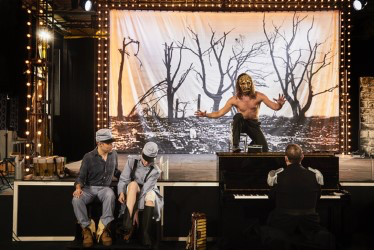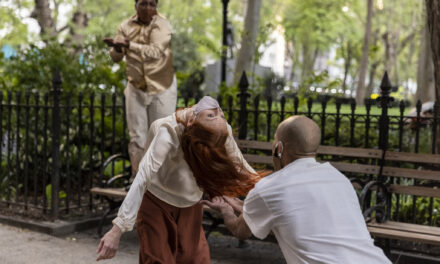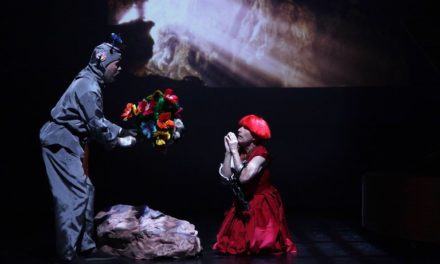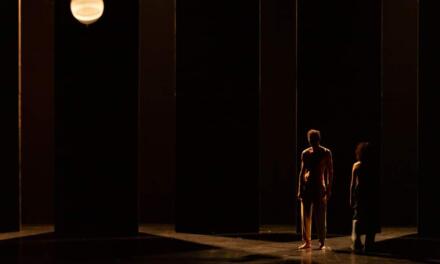What a delight, a relief and a sheer pleasure to sit through Olivier Py’s operetta for children and adults “L’Amour Vainqueur”. One hour-long, this musical adaptation of Brothers Grimm’s Maid Maleen tale takes the audience through the history of French theatre, including its highbrow traditions of the Alexandrine poetry, usually reserved for tragedies, and the charming, even a bit over-the-top, theatricality of its cabaret performances and musical halls.
The story is your typical children’s tale with the charming Prince and Princess in its centre. There are also an evil King and even more malicious General, and a pair of simpletons helping the lovers to get together. Olivier Py’s tale, of course, has an adult like twist: at the end it was aimed both for the children and their guardians.
Py’s Princess is brave and open-minded, she also likes to practice her free will. A true feminist, she refuses to marry the English King because she loves another. For that, she is severely punished. Her father sends her to the tower for seven years without a chance to talk to her beloved or see the light of the day. When she is finally released from her prison, Princess learns that the world of her childhood has vanished. There was a devastating war and most likely Prince, the love of her life, has perished in it.
She has no choice but to join the army of vagabonds and exiles: theatre – singing and dancing in this pay – becomes her true home. In meanwhile, we learn, Prince did go to the war. On the battlefield, he was severely wounded by the power-hungry General. Prince lost his face and now the kingdom has the faceless king, who is about to lose it to the wicked General. Several peripeteia later, however, we reach the happy ending with the true lovers’ marriage, the General’s banishment and the daughter of the castle’s dishwasher fulfilling her life dream of joining the pirates.
The stage is a replica of the old fashion theatre hall, with the painted backdrop sets that disappear under it and a piano in front of it. Changing wigs and costumes, the actors play multiple characters. They switch from the high brow Alexandrines to the nursery-like type of poetry, dancing and singing at the same time. As the maker of this production, Olivier Py plays with his audiences’ nostalgia for and knowledge of what theatre history books call “boulevard theatre”. It is obvious Py respects this tradition too but also knows how to manipulate it, so his critical message about the wars made by the power-thirsty individuals still reaches its spectators.
L’Amour vainqueur.
Text, direction, and music by Olivier Py, with Clémentine Bourgoin, Pierre Lebon, Flannan Obé, Antoni Sykopoulos
Stage design, costumes, and makeup by Pierre-André Weitz. Lights by Bertrand Killy. Musical arrangements by Antoni Sykopoulos
Production Festival d’Avignon, in co-production with Opéra de Limoges, Opéra de Lausanne, Scène nationale du Sud-Aquitain (Bayonne), Théâtre Georges-Leygues (Villeneuve-sur-Lot), with the support for the 73rd edition of the Festival d’Avignon: Spedidam, and with the help of Odéon-Théâtre de l’Europe. Residency La FabricA du Festival d’Avignon.
This article was originally published in Capital Critics Circle on July 12, 2019, and has been reposted with permission.
This post was written by the author in their personal capacity.The opinions expressed in this article are the author’s own and do not reflect the view of The Theatre Times, their staff or collaborators.
This post was written by Yana Meerzon.
The views expressed here belong to the author and do not necessarily reflect our views and opinions.


















